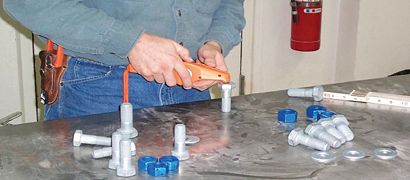Difference between revisions of "902.20 Material Inspection for Sec 902"
m (902.14 Material Inspection for Sec 902 moved to 902.20 Material Inspection for Sec 902: Per Traffic and CM, revision to bring policy into substantial compliance with the 2009 MUTCD.) |
m (updated link) |
||
| Line 23: | Line 23: | ||
| − | [[Category:902 Signals|902. | + | [[Category:902 Signals|902.20]] |
Revision as of 11:11, 18 January 2012
This article establishes procedures for inspecting and reporting those items specified in Sec 0902 for which Materials has responsibility and are not specifically covered in Materials Details of the Specifications.
Apparatus
- (a) Magnetic gauge, reading range of 0-40 mils (0-1000 m).
- (b) Rule with suitable graduations to accurately measure the material to be inspected.
Procedure
The highway lighting items normally field inspected by Materials are galvanizing of steel posts and anchor bolts and nuts.
Field determination of weight (mass) of coating is to be made on each lot of material furnished. The magnetic gauge is to be operated and calibrated in accordance with ASTM E376. At least three members of each size and type offered for inspection are to be selected for testing. A single-spot test is to be comprised of at least five readings of the magnetic gauge taken in a small area and those five readings averaged to obtain a single-spot test result. Three such areas should be tested on each of the members being tested. Test each member in the same manner. Average all single-spot test results from all members to obtain the average coating weight (mass) to be reported. The minimum single-spot test result would be the minimum average obtained on any one member. Material may be accepted or rejected for galvanized coating on the basis of magnetic gauge. If a test result fails to comply with the specifications, that lot should be re-sampled at double the original sampling rate. If any of the resample members fail to comply with the specification, that lot is to be rejected. The contractor or supplier is to be given the option of sampling for Laboratory testing, if the magnetic gauge test results are within minus 15 percent of the specified coating weight (mass).
Bolts and nuts specified that meet the requirements of ASTM A 307 shall be accompanied by a manufacturer's certification statement that the bolts and nuts were manufactured to comply with the requirements of ASTM A 307. If the specifications require the bolts and nuts to be galvanized, the manufacturer's certification shall also state the nuts and bolts were galvanized to comply with the requirements of AASHTO M 232 or state that they were mechanically galvanized to comply with the coating thickness, adherence and quality requirements of AASHTO M 232, Class C. Anchor bolts and nuts or high strength bolts and nuts except AASHTO M 164, shall be accompanied by a test report certified to be representative of the mechanical tests for each size in each shipment. AASHTO M 164 bolts shall be accompanied by a manufacturer's inspection test report for each production lot or shipping lot furnished, and certifying that the bolts furnished conform to the requirements specified. The inspector shall carefully examine the certifications to ensure that they are applicable and show conformance with Sec 902.4. All bolts nuts, and washers are to be identifiable as to type and manufacturer. Bolts, nuts and washers manufactured to meet ASTM A 307 will normally be identified on the packaging since no special markings are required on the item. High strength bolts and nuts require special marking on the item. The specified AASHTO or ASTM is to be consulted for the required identification marks on high strength bolts and nuts. Dimensions are to be as shown on the plans or as specified. Weight (Mass) of zinc coating, when specified, is to be determined by magnetic gauge in the same manner as described in the previous paragraph except a smaller number of single-spot tests will be sufficient. Samples for Laboratory testing are only required when requested by the State Construction and Materials Engineer, or when field inspection indicates questionable compliance. When samples are taken, they are to be taken at the frequency and of the size shown in Table 2, Sampling Requirements.
Report (Records)
Reports shall indicate acceptance, qualified acceptance or rejection. Appropriate remarks as described in EPG 106.20 Reporting are to be included in the report to clarify conditions of acceptance or rejection. Distribution of reports or materials purchased under a MoDOT purchase order is to be as described in EPG 1101 Materials Purchased by a MoDOT Purchase Order.
Tests for weight of coating are to be reported through SiteManager. If a sample is submitted to the Central Laboratory for testing, use SiteManager.

